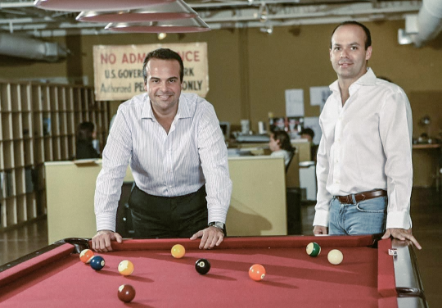Need tech help? No problem.
Nate Beers decided he was done playing professional poker. He needed a new career.
“I’d always had an interest in coding, and I’d done some in high school,” said Beers, 30. “But I always kind of put it off.”
He went through a programming bootcamp in San Francisco that pointed him to LaunchCode, a nonprofit operating in South Florida. The organization finds apprenticeships for people who have built coding skills in classes or on their own.
He applied for a spot and, within weeks, had landed an apprenticeship at Miami-based ad agency República.
“It was a perfect match,” he said.
Beers is the first South Florida success story for LaunchCode, which just opened applications for apprenticeships at more than 100 local companies, from brand names like Burger King to three-person startups.
The brainchild of Square co-founder and Miami resident Jim McKelvey, LaunchCode aims to help growing firms find tech talent they might have overlooked. Ninety percent of apprentices screened by the organization are offered full-time jobs in 90 days.
Finding qualified workers is one of the biggest obstacles South Florida tech leaders cite as they look for ways to turn the region into a technology hub for Latin America, and LaunchCode is getting noticed.
This month, President Barack Obama heralded LaunchCode for building a fast track to economic opportunity in areas that are hurting for tech talent. The U.S. Department of Labor projects there will be 1 million open tech jobs in 2020, he said.
“We tend to think that all these tech jobs are in Silicon Valley …. But the truth is, two-thirds of these jobs are in non-high-tech industries like health care, manufacturing or banking, which means they’re in every corner of the country,” Obama said at the National League of Cities 2015 Congressional City Conference.
LaunchCode is a way to find skilled workers as four-year computer science degrees get more expensive and less necessary, Obama said.
“If you can do the job, you should get the job,” he said.
McKelvey founded LaunchCode in 2013 after realizing how scarce tech talent was in his hometown of St. Louis.
As his $6 billion mobile payments firm Square prepared to open a St. Louis office, McKelvey would get calls from other local hiring managers, livid that he stole their only Java developer. He wondered how competition for one skilled worker could be so stiff.
“If we’re playing a zero-sum game, this is a huge societal problem,” he said.
Something else bothered McKelvey: The murder of a 22-year-old pizza delivery man in North St. Louis – a region most of the country now knows as Ferguson.
McKelvey knew the man’s father, a tile setter. The tech entrepreneur couldn’t understand why three people would murder a delivery man, but decided all three couldn’t be crazy. In his mind, the incident pointed to a lack of economic opportunity.
“I just got pissed off enough that I wanted to fix it,” he said.
McKelvey didn’t believe anyone needed to go to college to be a programmer. So after getting dozens of St. Louis companies to agree to offer apprenticeships, LaunchCode began seeking out people who had learned basic coding skills — whether it was in school, in a weeks-long coding bootcamp or on their own.
If an applicant doesn’t pass an online skills assessment, LaunchCode points him or her toward affordable, reputable education options. The organization has partnered with Miami Dade College to offer an introductory computer science course.
For candidates who clear the bar, LaunchCode staff conduct in-person or video interviews to help find companies that are a good cultural fit.
In its first year, LaunchCode’s St. Louis office placed 140 people, ranging from age 16 to 60, in programming jobs. About 42 percent of the candidates were previously unemployed.
“The biggest success was getting a guy who had been unemployed for 10 years – a veteran – his first job,” McKelvey told the Business Journal. “We got him off VA disability. We got him off welfare. He, for the first time in 10 years, is supporting himself and his dog.”
What’s more, every company LaunchCode has approached – more than 300 so far – has agreed to partner with the organization, he said.
McKelvey decided to expand LaunchCode to South Florida after he moved to Miami last year.
He hired Mariana Rego, who co-founded the nonprofit Design Thinking Miami, to run the South Florida office. They soon found space inside the Idea Center at Miami Dade College.
Under Rego’s leadership, LaunchCode amassed 102 South Florida company partners by early March, when applications officially opened.
Those companies span many industries and range from large, well-known firms – Miami Children’s Hospital, Univision, Zumba Fitness – to startups.
Working with LaunchCode is a way for Boca Raton-based Modernizing Medicine to make sure it is hiring top talent, even as it experiences explosive growth.
“It gives us an innovative outlet to find talent and put people to work that have really great skills, but that we wouldn’t find through traditional channels,” Modernizing Medicine CFO and COO Karen O’Byrne said.
The electronic medical records company added about 30 programming jobs last year, O’Byrne said. But until now, hiring managers hadn’t given much thought to candidates who didn’t finish college.
“We do typically look for a minimum of a bachelor’s degree,” she said, but that’s about to change.
LaunchCode’s screening will help the company find people who fill specific needs, no matter where they were trained, O’Byrne said. There’s “high demand and scarce supply” for many of the skills Modernizing Medicine seeks, such as iOS development, she said.
“We’ve been very fortunate in being able to recruit talent across the board, tech included,” she said. “But because we’re growing so quickly, it may take a bit longer … to find the right people.”
LaunchCode’s smaller partner firms face different hiring challenges, but stand to benefit just as much, said David Cohn, CEO of Miami-based startup PhotoTap.
PhotoTap isn’t looking to expand its three-person team at the moment. But when the company is ready to hire, it won’t have much time to lose.
“When you’re a startup, when that need comes, you want to take care of [it] right then,” he said. “You don’t want to spend six months interviewing 50 guys.”
Not only is LaunchCode fast, but the team seems to understand technology better than most general recruiting firms, he said.
The nonprofit’s focus on cultural fit also makes it more likely that a new hire will stick around, which is key for a small company, Cohn added.
“One of the biggest problems with a startup is your lack of time,” he said. “So to go out there and spend time training someone or hiring someone and then to have that fall flat, you’re back to zero again.”
It’s been more than a month since Nate Beers joined República, and the company’s CEO, Jorge A. Plasencia, said he is sold on LaunchCode.
LaunchCode paves an easier path to finding skilled workers – people who may have been here all along, he said.
“Many times, we’ve had to move people from other cities to Miami,” Plasencia said. “Shame on us if we can’t find the talent here.”
Source: South Florida Business Journal






























